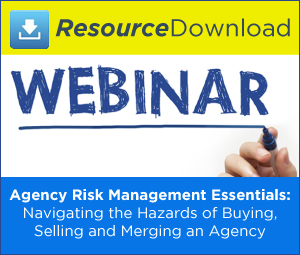
Have a plan in place when your
business undergoes a transition. Without a doubt, a purchase or a
sale of an insurance agency triggers additional E&O exposure. In
preparing to write this article, I interviewed several successful agencies
in order to learn more about the processes they employed when acquiring
other agencies. These agencies all took several steps in order to help
reduce their exposure to professional liability claims.
First, the acquiring agency should perform due diligence before the
decision is made to acquire the new book. Many agencies have a dedicated
quality management team trained in this process. The agency should make
sure the new business is within its "comfort zone" or area of
expertise. For example, an agency that handles primarily P & C business
might not be a good fit to acquire an agency that handles certain
specialized lines of business, such as marine liability or equine
insurance. There could be certain accounts or risks the agency does not
want to assume. In turn, particular E&O exposures could be identified
that the agency does not want to assume.
This article is too brief to discuss all the legal aspects involved with
acquiring an agency. In short, the agency should consult with its attorney
and make sure the purchase agreement is satisfactory and covers who assumes
responsibility for E&O exposures. Often, the purchasing agency requires
the seller to maintain tail E&O coverage for a particular amount of
time; regardless, these questions should be closely examined.
Assuming the agency decides the acquisition is a good fit and a purchase
agreement is executed, the purchaser should conduct a systematic review of
the newly acquired business as soon as possible, checking such details as
types of coverage and amounts. Make sure the right people – consultants and
experts -- are involved in this review process. An expert can focus on the
potential exposures involved. Most successful agencies have procedures and
practices in place during the acquisition process. They often send letters
to all their new clients, introducing themselves. These letters usually
include an invitation to meet to discuss the clients' policies and advise
them to review their coverages, contact the agency with questions or
request additional coverages or limits.
An audit should be conducted during the transition process. There should be
written procedures in place for how the audit is to be conducted. The audit
will help identify potential E&O exposures and will provide an
opportunity to cross sell. The plan should be detailed and should identify
specific responsibilities for specific people and should include the timing
of when the audit should take place. The transition plan should be closely
monitored in order to ensure it is being implemented correctly.
Documentation is crucial. It is especially important that the agency
ensures all policy applications and renewal applications are signed by the
applicant. This practice goes a long way in proving intent, what the
customer wanted for coverage.
These steps should still be taken even when a family-owned agency is transitioning
within a family. Prior to the time that a family member takes over the
agency, the owner and successor should adopt a systematic review of the
accounts so that the person who acquires the account can become familiar
with the accounts.
In sum, a transition in ownership can produce considerable unwanted E&O
exposure. This exposure can be greatly reduced with due diligence before
the transition or purchase. The purchaser should carefully examine the type
of book of business to ensure it is within the agency's comfort zone.
Consult with your attorney to make sure the purchase contract sufficiently
protects you and that the purchased agency has E&O tail coverage.
Implementing a dedicated quality management team to review the new book and
the acquired agency's practices and procedures is crucial. Review all
checklists and manuals and determine if they need to be updated. It is
important to reach out as soon as possible to all new policyholders and
remind them to review their policies and to contact the agency immediately
with questions or changes. Implement any needed training with new staff at
the earliest possible moment. As in everything, documentation is key!
*******************
Brian Butcher is a vice president, claims expert with Swiss Re
Corporate Solutions and teleworks out of the office in Overland Park,
Kansas. Insurance products underwritten by Westport Insurance Corporation,
Overland Park, Kansas, a member of Swiss Re.
This article is intended to be used for general informational
purposes only and is not to be relied upon or used for any particular
purpose. Swiss Re shall not be held responsible in any way for, and
specifically disclaims any liability arising out of or in any way connected
to, reliance on or use of any of the information contained or referenced in
this article. The information contained or referenced in this article is
not intended to constitute and should not be considered legal, accounting
or professional advice, nor shall it serve as a substitute for the
recipient obtaining such advice. The views expressed in this article do not
necessarily represent the views of the Swiss Re Group ("Swiss
Re") and/or its subsidiaries and/or management and/or shareholders.
Copyright © 2018, Big "I" Advantage, Inc. and Westport Insurance
Corporation. All rights reserved. No part of this material may be used or
reproduced in any manner without the prior written permission from Big
"I" Advantage. For permission or further information, contact
Agency E&O Risk Manager, 127 South Peyton Street, Alexandria, VA 22314
or email at eo@iiaba.net.
| |

